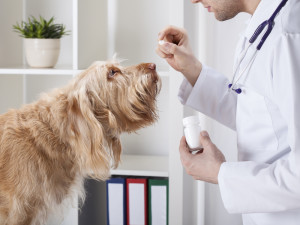How to Navigate Tough Decisions About Your Pet
Lessons on how to cope with a serious health diagnosis.

Share Article
Many of us live in dread of receiving bad news about our pets. We fear the moment when, looking at our vet’s face or hearing their voice, we know that something is seriously wrong. Unfortunately, this is usually a matter of when, not if — given the short lifespan of our beloved furry family members, those moments come to most of us.
While it can feel overwhelming to receive bad news, especially if it is unexpected, there are things you can do to help both yourself and your pet during this difficult time. Here are ten suggestions from veterinary practitioners for guiding clients, friends, and family through serious diagnoses. It might hurt to even think about, but forewarned is forearmed. Knowing what to do in a difficult moment may make all the difference to your pet.

Save on the litter with color-changing tech that helps you better care for your cat.
1. Determine the level of urgency.
If your pet is suffering and could benefit from emergency treatmentopens in a new tab, including surgery, you may not have the luxury of time to ponder all the factors. Ask your vet about next steps and how important it is that you decide immediately. If you are by yourself, consider taking a moment to call a friend or family member to talk things through. Sometimes, just saying things aloud can help you clarify your thoughts.
2. Put it in writing.
You may have heard that people remember only a small percentage of what their doctors say in the examining room, and the same is true at the vet. Taking notesopens in a new tab on what your veterinarian tells you can be extremely helpful. If you prefer, you can also ask the doctor to write down their recommendations. If you take your pet for follow up appointments, or to a specialist, it’s a good idea to bring a list of questions.
A list will help jog your memory during what can be a stressful conversation. It can also be a tool to help decrease your anxiety; sometimes writing down your concerns helps you to stop obsessing about them in your mind.
3. Consider a specialist.
As a general practitioner, your regular veterinarian typically does a little bit of everything. If your pet has something that can be addressed by a board-certified veterinary specialistopens in a new tab in internal medicine, oncology, orthopedics, or another area, ask your vet for a reference, or make an appointment with your closest specialty center.
Board-certified specialists have both extensive additional training and the experience that comes with treating many pets with the same condition. They also have access to information that your regular doctor does not; specialists stay in touch with each other and share information about research studies even before they are published. A specialist may also be able to offer more advanced treatments. While you may ultimately choose not to pursue those treatments, you will have made your decision with the most current information.
If you schedule an appointment, let your regular veterinarian know and ask that your pet’s health record, including digital X-rays and test results, be provided to the specialist.
4. Consider holistic care.
There are times when a pet can receive a very serious prognosis, and holistic care can offer an alternative to severe Western treatments that don't necessarily consider an animal's quality of life. Traditional Chinese Veterinary Medicineopens in a new tab (TCVM), for example, can be utilized by itself or in conjunction with conventional medical treatment and alleviate suffering in a sick pet.
The important thing is to find a qualified practitioner. In the U.S., there are two TCVM schools: the International Veterinary Acupuncture Society and the Chi Institute; you can search graduates by region on their websites. Other resources include the American Academy of Veterinary Acupuncture and the American Holistic Veterinary Medical Association.
5. Beware of “miracle cures” and other online traps.
Holistic pet care has grown in the last several years, and many companies have sprung up online, hawking various supplements they claim will cure your pet virtually overnight. These companies know that people are often vulnerable when their companion animals are at risk and are searching for anything that might help.
Unfortunately, many of them are just not likely to help, and some could even be harmful. True holistic care involves treating the pet as an individual, not as a representative of their disease. Try not to be swayed by the convincing testimonials these websites typically display; in general, it is a good idea to get your veterinarian’s opinion before purchasing something online.
6. When doing research online, choose your sources of information wisely.
Naturally, many people want to research their pet’s condition online, but depending upon the websites they visit, the information they gather can vary from accurate to completely wrong. One good option is veterinarypartner.comopens in a new tab, an excellent free website maintained by the Veterinary Information Network (VIN), a subscription-based network of board-certified veterinary specialists.
Many pet parents have received valuable support from others struggling with the same health issue for their pet on websites or forums for specific problems. However, keep in mind that each animal is an individual, and just because someone says their pet responded in a certain way, it doesn’t mean yours will. If you read something that is meaningful to you, write it down to ask your veterinarian.
7. Remember the real world.
Sadly, we live in a world where money must be a factor in many people's decisions for how they treat their pets. Weighing the financial costsopens in a new tab and benefits of diagnosis and treatment is incredibly stressful, and family members may have differing opinions, which adds to the strain.
Even if money isn’t a concern, we are often faced with making important decisions without having all the facts; vets aren't psychic, they're just going off what can be known through initial testing and offering options for further diagnosis opens in a new tab— which can be unaffordable or invasive testing. Ultimately, both veterinarians and pet parents have to make the best decisions possible based on the information and resources that are available.
8. Consider your pet’s perspective.
Sometimes, a veterinarian may recommend a procedure that seems extreme from a human point of view, such as a leg amputation or an eye removal. However, this may not be as big an issue for your pet. Relieved of a painful part of their body and unconcerned about their appearance, most pets readjust quickly and maintain an excellent quality of life as a “tripawdopens in a new tab,” or with only one eye.
9. Create a bucket list.
Planning fun activities to do with your pet is a good coping strategy, and a way to focus on the positiveopens in a new tab. Even if your cat or dog’s time is measured only in hours, you may be able to give them their favorite food and have friends and family visit to say goodbye. If there’s more time, you have the option of taking them to visit their favorite people and places or doing some things you had been meaning to do. If they're agile enough, take them to a fun training classopens in a new tab, on a special hike, or just drive them around their favorite neighborhoods if not.
10. Trust yourself.
This may be the most important advice: trust that your love for your petopens in a new tab will guide you as you make decisions. No one loves your pet more than you do, which makes you the best possible advocate. Many people feel guilty as they weigh the options, but remember that your relationship is built on love, not guilt. Your pet trusts you, so trust yourself.
Finally, know that many, many others have been in these difficult situations. As Irving Townsend said in his book Separate Lifetimes, “We who choose to surround ourselves with lives even more temporary than our own, live within a fragile circle … we would still live no other way.”
Karen Fine, DVM, CVA
Karen Fine is a holistic veterinarian who practices integrative medicine and operates her own house-call practice in Worcester, Mass. Her free “Guide to Writing a Pet Obituary” is available on her website.
Related articles
![A woman in a bright yellow-orange sweater holding a striped kitten in one hand and a credit card in the other while using her laptop in front of her]() opens in a new tab
opens in a new tabHow to Get Help With Vet Bills for Dogs Who Need Surgery
Worried about the cost of making your pet feel better? Help is on the way.
![Girl Carefully Hugs A Sick Lying Dog]() opens in a new tab
opens in a new tabHow Pet Hospice Can Help When It’s Nearly Time
Veterinary hospice and palliative care expert Dr. Shea Cox, DVM, on an alternative to euthanasia.
![A woman laying on the bed with her Golden Retriever dog laying next to her]() opens in a new tab
opens in a new tab8 Practical and Healing Ways to Remember Your Pet After They Pass
Even though it’s the last thing you want to think about.
![Man hugs his dog to his face]() opens in a new tab
opens in a new tabHow Will I Know When It’s Time?
End-of-life veterinary specialist Dr. Shea Cox on how to make the most difficult decision in your pet parenting journey.





